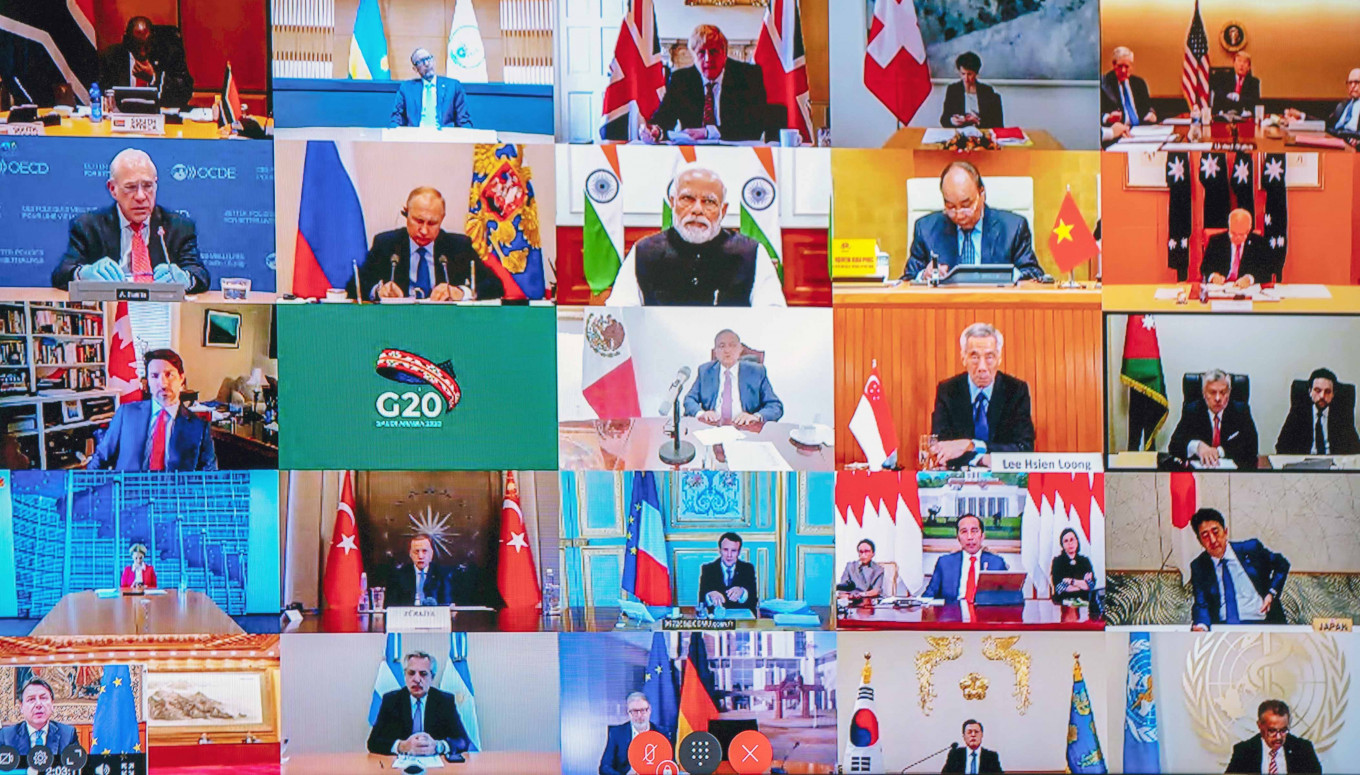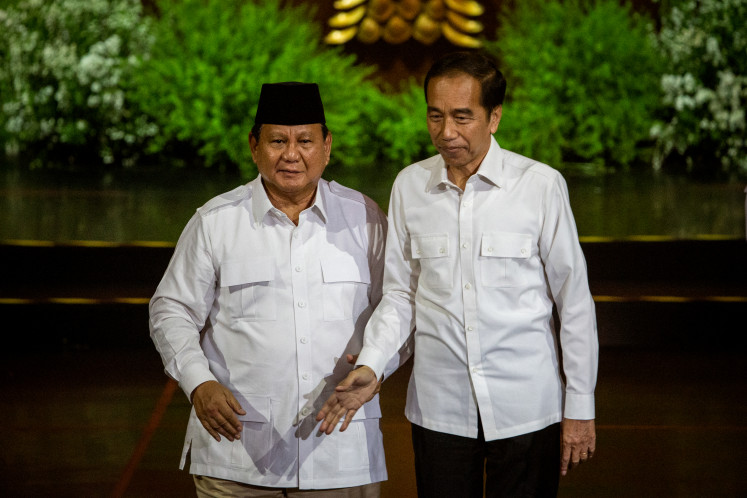Popular Reads
Top Results
Can't find what you're looking for?
View all search resultsPopular Reads
Top Results
Can't find what you're looking for?
View all search resultsGlobal leadership during the COVID-19 pandemic is the only way to leave no one behind
The G20 must develop and deliver a comprehensive response to both the unfolding public health emergency and, increasingly, the global economic and social emergency in a way that provides confidence to people and markets.
Change text size
Gift Premium Articles
to Anyone

The scale, speed and threat of the global COVID-19 pandemic are unprecedented, as is the financial response now required. According to experts, this pandemic is unlikely to be quickly contained. It may ebb and flow over time, across seasons and between regions, underscoring the importance of a coordinated global response.
As former presidents and prime ministers, we have variously led our democracies in response to governance transitions, financial crises, civil unrest and violent conflict, and to epidemics as serious as SARS, H1N1, MERS and Ebola. Given the startling velocity with which COVID-19 has spread globally, this pandemic must be addressed urgently in real time. That will require a leadership approach based on values of solidarity, equity and cooperation which transcend a sole focus on national interests – that alone would prove insufficient to stop a global pandemic.
We welcomed the convening of the first virtual Leader’s Summit of the G20 on March 26. The message sent from the Club of Madrid beforehand aimed to encourage the G20 to establish global solidarity in the fight against the pandemic. We fully agree with the call made by the Director General of the World Health Organization to “fight, unite, ignite” against the virus that threatens to tear the world apart.
Read also: G20 nations pledge 'united front' on coronavirus crisis
We call on the G20 to provide the leadership and support needed for a globally coordinated response. The G20’s engagement is particularly important. As we saw a decade ago during the financial crisis, its convening of countries from every region of the world representing more than 90 percent of the global economy and two-thirds of its population can be critical.
The G20 must develop and deliver a comprehensive response to both the unfolding public health emergency and, increasingly, the global economic and social emergency in a way that provides confidence to people and markets. This response must go beyond platitudes and principles. It must result in concrete decisions, such as to eliminate barriers to the free movement of medical personnel and equipment, to coordinate efforts around vaccine development and testing, and to support low income countries which have poor public health infrastructure and capacity.
To date, world leaders have largely focused on the outbreaks in their own countries. The priority given by leaders to solving the problems of their own citizens is understandable. No country is safe, however, from a pandemic like COVID 19. Stand-alone national strategies will not only prove ineffective in stopping the virus, but they would also mean that the international response will be weaker than needed to prove effective.
The World Health Organization has worked admirably within its capacity to coordinate a global response. Yet one multilateral agency left to act alone cannot perform miracles. The multilateral system as a whole must step up to provide the response required. The UN Security Council should resolve to address the global pandemic as a threat to global peace and security. The UN system as a whole is only as strong as its members.
The COVID-19 response requires leadership at the global level, to tackle not only the outbreak, but also to coordinate efforts to stave off the next great economic depression. Governments should not develop stimulus packages in isolation. We know from history this will only create fiscal imbalances that will make the recovery harder.
And governments must also align their efforts with the Sustainable Development Goals and the Paris Agreement to ensure we are better placed to tackle other global challenges like climate change as we emerge from this crisis.
We are especially concerned regarding the rapid spread of COVID-19 to countries in the Global South. Public health infrastructure and capacities have already been sorely stretched in China, South Korea, Europe and the United States. United Nations Secretary General (and Club of Madrid member), Antonio Guterres, has rightly called on wealthier countries to focus beyond their national challenges and work towards a comprehensive response which supports poorer countries.
The proposal of the government of Norway to the G20 to establish an international fund to help the countries of the Global South is a step in the right direction. A global response fund which envisions public-private cooperation across borders, at the disposal of international public health experts, is critical for leaving no one behind both between and within countries.
Read also: Indonesian manufacturers step up as G20 nations coordinate global medical supply
In many places, identifiable groups have not enjoyed full access to goods, opportunities and services. Public health responses must take into account the need to focus on and include those historically or otherwise marginalized from healthcare, including ethnic and religious groups, indigenous peoples, minorities, migrants, women and youth. If their exclusion is replicated in the response to the pandemic, not only will they be potentially decimated by illness but, they may also become continued transmitters of the virus even as it begins to recede among other populations.
Technology is a part of the solution, but it also needs to be applied equitably between and within nations. We know that digital transformation has not been inclusive and equitable across societies, particularly as it affects women and minorities. We must be sure that the technological responses we develop like testing, medical care and, in time, vaccines are distributed equitably.
In South Korea for example, access to continuous and rigorous testing procedures made accessible to the public through user-friendly drive-through and even walk-through sites, has maintained civil order and allowed public health managers to achieve a high recovery rate.
Efforts to support the global economy must also focus on the most marginalized and excluded populations. This means building economic recovery strategies around employment, poverty reduction and sustainable business models.
Without an effective global strategy and action, COVID-19 will continue to spread, taking a heavy toll on human health and well-being and severely damaging economies and societies. As former presidents and prime ministers, we call on the G20 and world leaders to finance and empower a reinvigorated and coordinated international response which leaves no one behind and aims to stop the COVID-19 pandemic.
---
Jan Peter Balkenende was prime minister of the Netherlands (2002-2010); Ban Ki-moon was secretary general of the United Nations (2007-2016); Kjell Magne Bondevik was prime minister of Norway (1997-2000; 2001-2005); Helen Clark was prime minister of New Zealand (1999-2008); Benjamin Mkapa was president of Tanzania (1995-2005); Ricardo Lagos was president of Chile (2000-2006); Kevin Rudd was prime minister of Australia (2007-2010, 2013); Aminata Touré was prime minister of Senegal (2013-2014); and Danilo Türk was president of Slovenia (2007-2012). They are Members of the Club of Madrid, an association of democratic former presidents and prime ministers.










